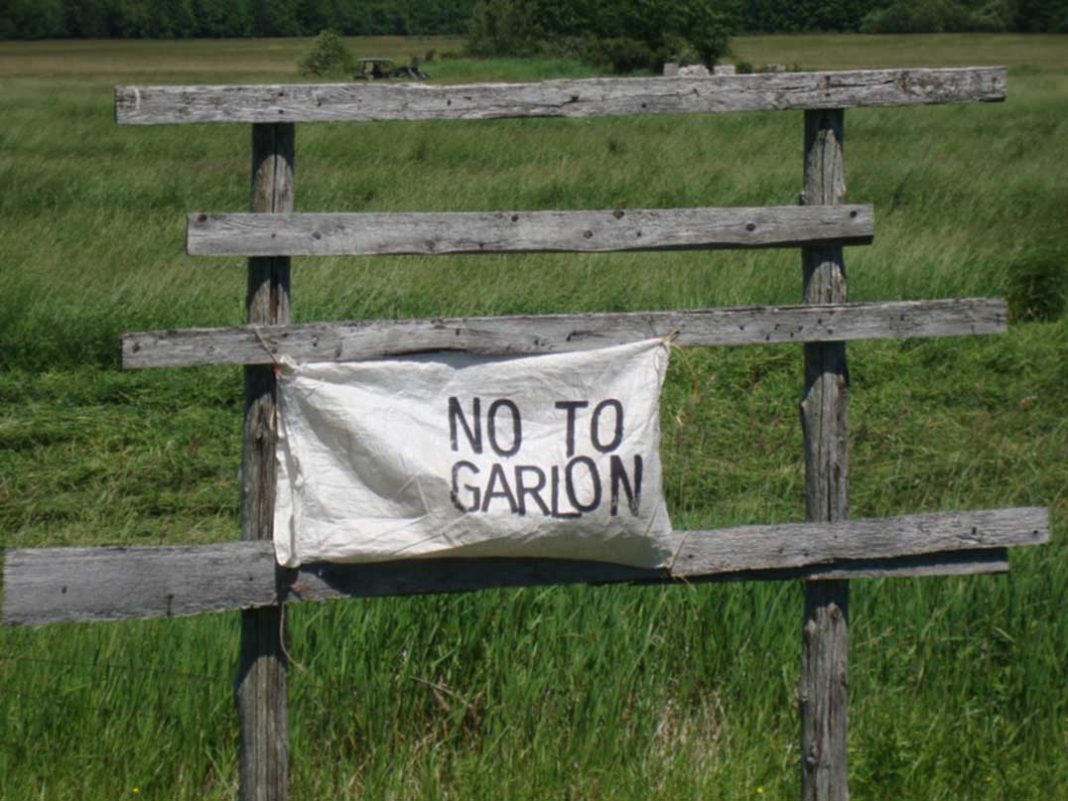KAGAWONG—Billings township council has decided to deny Hydro One permission to use Garlon spray as part of its standard operating procedures for vegetation clearing on township right of ways. Meanwhile, the Stop Garlon group will be distributing a petition all over the Island this week, directed to the Legislative Assembly of Ontario and asking the Minister of Environment to either change the body of the Pesticides Act and/or to make changes to the Pesticide Act and/or its regulations to limit all use of pesticides by utilities only to extreme circumstances and only on noxious non-native invasive weeds or plants which are displacing native varieties, and only when all other options have been eliminated.
Billings Councillor Barb Erskine had brought forward a motion for council to consider at its meeting Monday evening that council denies Hydro One approval to use Garlon in its vegetation management program.
“I put forward the motion because we need to clarify where we (council) stand on this issue,” said Councillor Erskine. “There has been some discussion by council and in response to a request and letter from Hydro asking for permission to spray. We need to put in what our decision is and that they have alternative ways to do the job, to cut back vegetation (manually) and not use any herbicides.”
“Using the word herbicide is generic and this would mean use of all (herbicide sprays) being used,” said Councillor Brian Parker.
“I can’t agree with any motion that says (all) herbicides. I will only support this if it says they can not use Garlon,” stated Councillor Nora Bath-Haring.
Councillor Parker said that Hydro One does not have the resources or manpower to do cutting as an alternative to cut back vegetation on right of ways instead of spraying. He pointed out the last time Hydro One crews did this work manually it took three years to clear most of the vegetation on his road, but due to funding constraints the work couldn’t be completed.
Councillor Bath-Haring noted that any policy on Hydro One spraying or not, should be consistent across the Island. She pointed out Monument Road is half in the township and half in Central Manitoulin and requires an overall policy on any possible spraying.
Councillor Sharon Alkenbrack suggested looking at this on an Island-wide basis could be brought forward to the Manitoulin Municipal Association
“But they (Hydro One) needs an answer from us on their request to use Garlon,” said Councillor Erskine.
“I won’t agree with using the word herbicides in the motion,” stated Councillor Bath-Haring.
It was pointed out by Councillor Parker that individual farmers use herbicides and any policy against the use of sprays could impact them.
Farmers and those involved in agriculture work can decide if they want to use herbicides on their individual properties, said Councillor Erskine. “But it is unnecessary for controlling vegetation by Hydro One, to use on our (Billings) property.”
“There is no way they will be able to do this vegetation cutback manually on the island, they don’t have the resources of funding,” said Councillor Parker.
Councillor Erskine questioned what the extra cost to Hydro One is by carrying out this work manually, and Councillor Parker said, “it would be in the thousands of dollars.”
It was noted by Councillor Bath-Haring that she would want the word Garlon in the motion taken out and the word herbicides put in before she would vote in favour of the motion.
“My fear is that there has been so much bad information put forward on the chemical Garlon, on how bad it is, but we haven’t heard both sides of the story,” said Councillor Parker.
“We have been discussing this issue for seven weeks,” stated Councillor Sharon Alkenbrack. “In that time we have heard only one side of the story. No one said it is okay to use Garlon spray, the only people that we’ve heard from are against it.”
“I think the majority of people just don’t care about it,” said Councillor Alkenbrack. “All we are doing is responding to Hydro One’s letter. If we pass the motion we are saying no to Garlon this time, not banning it in the township.”
“So the issue will come back again in the future,” said Councillor Bath-Haring.
Councillor Erskine said she has read what is happening in Muskoka and the stance by council. She pointed out there has been no catastrophe’s reported there in using Garlon. However, “we have also been told if Garlon is sprayed properly and the weather conditions are right, there is no problem. But if we don’t want to have any risk from the spray, we shouldn’t use it at all.”
The motion put forward by Councillor Erskine was to take out the word herbicides and instead include Garlon.
Councillor Parker requested a recorded vote be taken.
The motion denying approval to Hydro One to use Garlon on Billings Township properties in its vegetation management program was voted on with Councillors Erskine, Alkenbrack, Bath-Haring and Mayor Hunt in favour and Councillor Parker against it. However, Councillor Parker then said he would support the motion as the rest of council had. But, he added, “I’m truly against it (denying Hydro One the use of Garlon).”
Paul Darlaston of the Stop Garlon group said in an email to the Recorder after the meeting, “in parallel with the Stop Garlon action to successfully persuade Billings Township council to deny Hydro One permission to use Garlon spraying as part of their Standard Operating Procedures for vegetation clearing on their right of ways, we are also about to launch a petition (Island wide) to the Legislative Assembly of Ontario to ask the Minister of the Environment to make changes to the Pesticide Act and/or its regulations.”
The petition reads in part, “we the undersigned petition the Legislative Assembly as follows: that it should consider either A) changing the body of the Pesticides Act; and/or B) the related regulations, to limit all use of pesticides by utilities only to extreme circumstances and only on noxious non-native invasive weeds or plants which are displacing native varieties and only when all other options have been eliminated (rather than pesticides) being used as part of Standard Operating Procedure to sterilize re-growth on land on their right of ways as a means of reducing labour costs); and C) consider partially restoring to individual municipalities (lower or upper levels) the authority to determine when and where utilities may use listed pesticides. In these extreme circumstances within their jurisdictions.”





